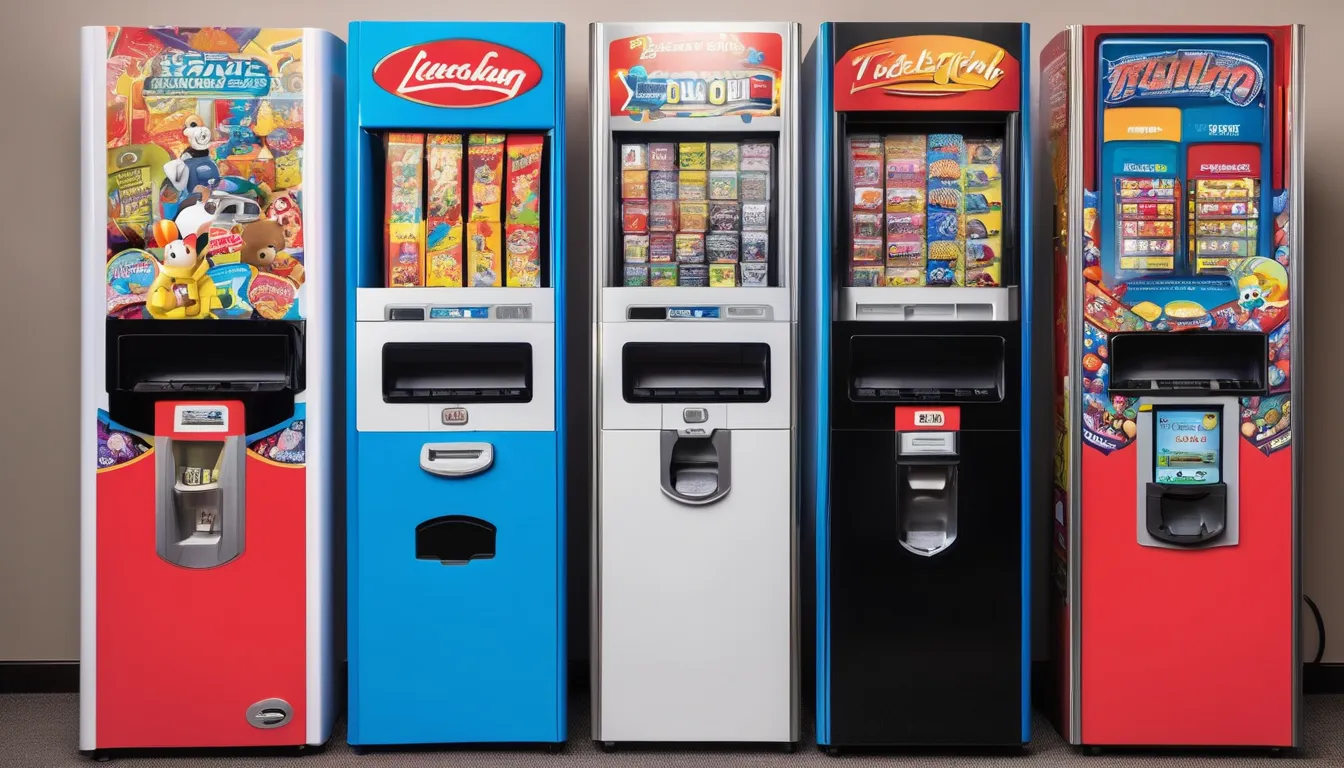When considering the potential tax advantages of trading card vending machines, you might be surprised by the numerous deductions available to business owners. From maintenance expenses to strategic placement decisions, these machines offer a unique opportunity to lower your taxable income. By exploring the tax benefits associated with trading card vending machines, you can uncover valuable insights into maximizing deductions and optimizing your financial position.
Tax Benefits of Trading Card Vending Machines
When considering the tax benefits of trading card vending machines, it's essential to understand how they can positively impact your financial situation. These machines offer a unique opportunity for tax advantages through deductions and operational expenses. By strategically placing these vending machines in high-traffic areas, you can maximize your profits and potential IOT自販機 benefits.
One key tax benefit of trading card vending machines is the ability to deduct business expenses related to their operation. This includes costs such as machine maintenance, restocking, and any fees associated with maintaining the machines. These deductions can help lower your taxable income, ultimately reducing the amount of taxes you owe.
Additionally, trading card vending machines can qualify for depreciation deductions. This means you can gradually deduct the cost of the machines over their useful life, providing ongoing tax benefits for years to come.
Depreciation Deduction Opportunities
Consider exploring the depreciation deduction opportunities available with trading card vending machines. Depreciation is a valuable tax benefit that allows you to deduct the cost of the vending machine over its useful life, rather than all at once. By spreading out the deduction over multiple years, you can lower your taxable income and potentially reduce your tax liability.
To take advantage of depreciation deductions, you must first determine the cost basis of the vending machine. This includes the purchase price, delivery and installation costs, and any other expenses directly related to acquiring the machine.
Next, you'll need to choose a depreciation method, such as straight-line or accelerated depreciation, based on IRS guidelines.
Tax Incentives for Business Equipment
You may be eligible for tax incentives when purchasing business equipment, giving you the opportunity to save money on your taxes. By taking advantage of equipment tax benefits and depreciation deductions, you can maximize your tax savings and improve your business's financial position. Understanding these tax incentives can help you make informed decisions when investing in equipment for your business.
Equipment Tax Benefits
Looking to maximize your tax benefits for business equipment? When it comes to equipment tax benefits, there are several ways you can take advantage of potential deductions. Here are some key points to consider:
- Section 179 Deduction: This allows you to deduct the full purchase price of qualifying equipment, up to a certain limit, in the year it was purchased.
- Bonus Depreciation: Offers businesses the ability to depreciate a significant percentage (usually 100%) of the cost of eligible assets in the year they're placed in service.
- Leasing Equipment: Lease payments are often fully deductible as a business expense, providing a way to benefit from equipment without the full purchase cost upfront.
- Energy-Efficient Equipment: Investing in energy-efficient equipment can qualify you for special tax incentives or rebates, promoting sustainability while reducing tax burdens.
Depreciation Deductions
Maximizing your tax benefits for business equipment involves understanding depreciation deductions. Depreciation deductions allow you to recover the cost of certain business assets over time through tax deductions. By spreading out the deduction over the useful life of the asset, you can lower your taxable income each year. This can lead to significant savings for your business.
To better grasp how depreciation deductions work, consider the following example showcasing different depreciation methods and their impact on tax deductions:
|
Depreciation Method |
Year 1 Deduction |
Year 2 Deduction |
Year 3 Deduction |
|---|---|---|---|
|
Straight-Line |
$5,000 |
$5,000 |
$5,000 |
|
Double-Declining-Balance |
$10,000 |
$6,000 |
$3,600 |
|
Sum-of-the-Years'-Digits |
$8,000 |
$4,800 |
$2,880 |
|
Units of Production |
Varies |
Varies |
Varies |
Understanding these methods can help you choose the most beneficial approach for your business equipment, maximizing your tax savings.
Maximizing Deductions With Vending Machines
When considering tax deductions for your business, it's essential to explore all potential avenues for maximizing savings. One often overlooked area where you can maximize deductions is through vending machines. Not only can vending machines provide a steady stream of income, but they can also offer various tax benefits. Here are some tips to help you make the most of your vending machine deductions:
- Maintenance Costs: Deduct expenses related to repairs, servicing, and upkeep of your vending machines.
- Inventory Expenses: Claim deductions for the cost of goods sold, including the trading cards inside the vending machines.
- Insurance Premiums: Don't forget to deduct the premiums you pay to insure your vending machines.
- Utilities and Rent: If you operate vending machines in a rented space, you may be able to deduct a portion of your rent and utility bills.
Reducing Taxable Income Strategically
Occasionally overlooked by business owners, strategically reducing your taxable income can lead to significant savings come tax season. One effective way to lower your taxable income is by maximizing your business expenses. This can be achieved by investing in items like trading card vending machines, which not only generate revenue but also offer opportunities for deductions. By carefully tracking and documenting all expenses related to your vending machines, you can reduce your taxable income while also enhancing your business operations.
Another strategy to consider is utilizing retirement plans and health savings accounts. Contributions to these accounts are often tax-deductible, providing a dual benefit of saving for the future while lowering your taxable income in the present.
Additionally, exploring tax credits and deductions specific to small businesses can further reduce your tax burden. By strategically managing your income and expenses, you can optimize your tax situation and keep more money in your pocket.
Financial Advantages for Business Owners
To fully grasp the financial advantages available to business owners, it's essential to understand the potential for increased profitability and tax savings that strategic financial decisions can bring. As a business owner, you can leverage trading card vending machines to not only generate additional revenue streams but also benefit from various financial perks. Here are some key advantages:
- Tax Deductions: Operating trading card vending machines can allow you to deduct expenses such as machine maintenance, restocking costs, and even a portion of your utilities.
- Increased Foot Traffic: Installing these machines can drive more customers to your establishment, potentially boosting overall sales and profitability.
- Low Overhead Costs: Compared to other ventures, trading card vending machines require minimal upkeep and have low operating costs, maximizing your profit margins.
- Diversification of Income: By incorporating vending machines into your business model, you can create diversified revenue sources, reducing dependency on any single income stream.
Frequently Asked Questions
Can Trading Card Vending Machines Be Considered a Business Expense?
Yes, trading card vending machines can be considered a business expense. They provide a potential source of revenue and can be deducted as a legitimate operating cost, helping you offset taxable income.
Are There Specific Tax Forms for Claiming Vending Machine Deductions?
Yes, there are specific tax forms for claiming vending machine deductions. You can find them easily on the IRS website. Remember to keep thorough records of your vending machine transactions to accurately claim your deductions.
How Does the IRS Determine the Depreciation Schedule for Vending Machines?
The IRS determines the depreciation schedule for vending machines based on their useful life. You'll need to consult IRS Publication 946 for guidelines. Generally, vending machines fall under the Modified Accelerated Cost Recovery System (MACRS) for depreciation.
Can Business Owners Claim Tax Credits for Using Vending Machines?
You can claim tax credits for using vending machines. Make sure to keep accurate records of your vending machine-related expenses to maximize your tax benefits. Consult with a tax professional for specific guidance.
Are There Limitations on the Amount of Deductions for Vending Machines?
You can deduct a portion of vending machine expenses, subject to IRS limits. Keep track of receipts and record maintenance costs. Consult a tax professional to ensure compliance and maximize your deductions.
Conclusion
Overall, trading card vending machines offer significant tax deduction potential for businesses. By taking advantage of depreciation deductions, tax incentives for business equipment, and strategic placement for maximum profits, owners can lower their taxable income and reduce their tax liability. With ongoing financial advantages, these machines are a valuable asset for businesses looking to maximize deductions and generate revenue.



